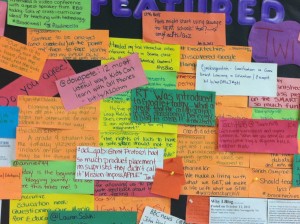Due Diligence and Social Media, Gaming and 21st Century Learning. Will education Institutions be held accountable?
 “What?, you’ve been banned from 8 different servers?” I shrieked at my 11 year old son.
“What?, you’ve been banned from 8 different servers?” I shrieked at my 11 year old son.
“It’s part of the game – to build trust, act normal, get more responsibility from the server owner and then, destroy” he explained.
I gasped.
“In many servers, the point is to build and protect. If you are in a server shared by others, you always take the risk of having your things stolen and your creations destroyed…but for some players, hacking into a server and destroying is the main point”.
I gasped. “But it’s not nice…..”
So he explains, “most teachers and adults aren’t even aware of what is going on in the background of the server and chats”. He grins and asks me, “Do you know that most of us can get the brute force server hosting password?” “Do you know how many servers don’t use ‘world guard or world bucket’ plugins to protect the word, protect the players?”
Minecraft is Boring. The real fun and thrill comes from the design, the programming and the challenge. What we do in schools is just the “Basics”. Boring.
I gasped. “Where do you learn all this stuff then?”
“Online. Together. Youtube” Never school.
I gasped. “What about Ethics? Character? Kindness?”, I wonder. I continue to wonder (now with my TEACHER LENS), “I’ve never heard of a school based PD about Minecraft servers, or world bucket”. Come to think of it, I’ve never heard of a mandatory in-service, PD session about any social gaming , or media tool or strategy.
Step Up Districts and Schools. Parents can’t do this alone. Make Social Media and Blended Learning Strategies as much a priority as traditional literacies. Be accountable and insist that all teachers have a solid understanding of the tools, strategies, and pedagogies so that we can help kids navigate in these online social environments. I want my children and my students to be safe online to understand online risks, and to have a chance to practice good online citizenship under the direction, coaching and support of a knowledgeable teacher. Help our children understand the hard and soft skills associated with these environments – help their parents understand how to coach, monitor, guide.
When it comes to the use of social media, gaming, multimedia and multi-modal learning strategies, I wonder, how many educators are encouraged to teach with it, without fully understanding the tool itself, or grasping the research behind its use, or acknowledging the implications of its use (including safety). How many educators are encouraged to teach with it without being provided the tools (computer, systems) and aren’t given in-school time to practice and learn?
It isn’t about updating our skills (like other literacies) it is about learning the skill.
The problem is that with other literacies (like reading and writing) we already knew them before entering the profession – we don’t have to learn them. We have a solid grasp about grammar rules, reading strategies, sentence structure, writing process. But with new literacies, especially the use of online tools, we are having to spend more time and resources to learn them. I’m not sure if our resources (people, infrastructure, knowledge) fully support this reality.
With this, I ask – where does the responsibility lay on education organizations to guide kids in an environment (even facebook, youtube, twitter, gaming)where they are spending so much time? Why are we OK with them teaching each other?
Ask yourself, in your school, or organization – Do teachers , leaders and parents know how to properly moderate a student blog? How about protect gaming server? or properly cite resources? or manage content privately while also being transparent and open? or create effective comments on a blog? or understand ‘public audience’? or how to have a conversation in an online chat?
In going back to my own children’s online behaviour, the story I started with – I as a parent can’t do it alone. I need support from the school system to guide and support my child’s learning in these online environments.

